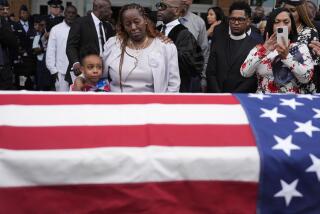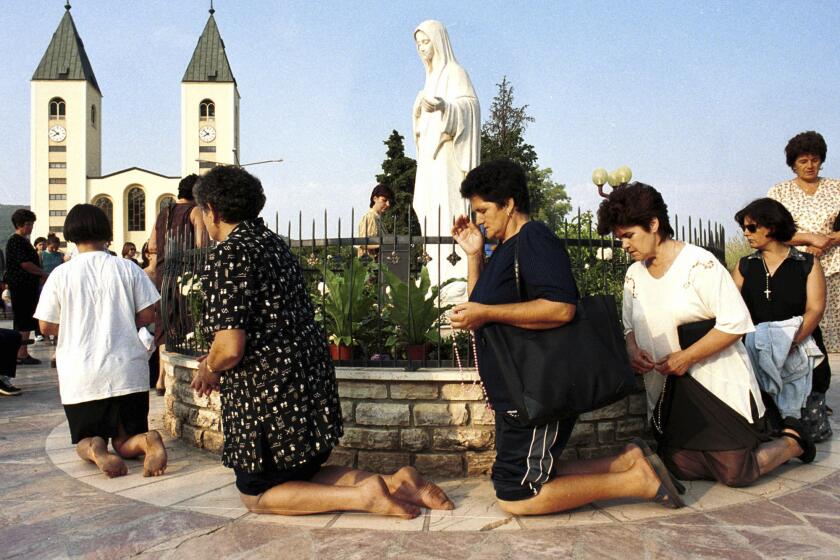Clashes bloody holiday in Iraq
Members of an obscure messianic cult fought Iraqi security forces Friday in two southern cities, leaving at least 80 people dead and scores injured, while spreading panic among worshipers marking Shiite Islam’s most important holiday.
The clashes, which erupted as Shiites marched, chanted and beat their chests in Basra and Nasiriya, represented the first major test for Iraqi security forces since Britain completed a transfer of responsibility for security in the region last month. They also pointed to dangerous divisions within Iraq’s majority Shiite population at a time when U.S. and Iraqi forces are claiming progress in curbing attacks by Sunni militants.
Members of the cult, which calls itself the Supporters of the Mahdi, mingled with the crowds in at least three sections of Basra and in Nasiriya, then fired shots at worshipers and the security forces, police and witnesses said.
Police said the cult’s leader, Ahmed Hassan, who called himself “the Yemeni,” was killed along with nearly 50 of his followers in the fighting in Basra, Iraq’s second-largest city. About 60 gunmen were arrested and large quantities of weapons were seized from a mosque linked to the group, said the Basra police chief, Maj. Gen. Abdul-Kareem Khalaf.
About 20 gunmen were killed in Nasiriya, police said. At least 10 policemen in Nasiriya and four in Basra also died, and at least 90 people were injured in the two cities, they said.
Iraqi officials asked U.S.-led forces to fly aircraft over Basra in a show of force, but otherwise handled the clashes themselves, the U.S. military said.
“The fact that the only support the coalition gave the Iraqi security forces was to do a flyover shows that they have come a long way,” said Maj. Winfield Danielson, a military spokesman.
The Supporters of the Mahdi is named after a figure most Muslims believe will appear with Jesus and establish peace and justice worldwide. Most Shiites believe the Mahdi is their 12th imam, a descendant of the prophet Muhammad who they say went into hiding in 878 and is still alive and will return.
Southern Iraq, which is overwhelmingly Shiite, is home to a number of small doomsday-style cults whose leaders either claim to be the Mahdi, or who believe they can hasten his return by spreading chaos.
Prime Minister Nouri Maliki’s office said the sect’s gunmen targeted government buildings in Basra and a police special forces unit in Nasiriya, whose commander was killed.
“This profane group, cloaking themselves in religion, have been exposed to our people, who cooperated with our armed forces to rout those evil schemes,” said a statement from Maliki’s office. “Our security and military apparatuses were able to take full control and bring tranquillity to the provinces of Basra and Nasiriya.”
In Nasiriya, however, residents reported hearing mortar blasts and gun and rocket-propelled-grenade fire well into the night.
“The situation in Nasiriya is really concerning and frightening,” said Naeem Enad, a college student hunkered down in his home as shots echoed in the distance. “I heard from one of the rapid response individuals that they [the sect] are not more than 100 people, however their creed is to fight to the death.”
Fearful that the bloodshed could spread, authorities imposed indefinite curfews in Basra, Nasiriya and the holy city of Najaf.
Last January, U.S. and Iraqi forces fought and killed hundreds of members of Heaven’s Army, a messianic group they alleged was plotting attacks on the Shiite religious leadership in Najaf. The group’s leader, Dhyaa Abdul-Zahra, was killed in the fighting.
The Supporters of the Mahdi believe that Hassan, their leader, is the son of the awaited Mahdi; it was not immediately clear whether the two groups are linked.
Last month, security forces detained 12 members of Hassan’s group in Basra, eight in Nasiriya and one of its leaders in Najaf, police said.
Friday’s violence occurred as hundreds of thousands of worshipers across Iraq took part in Ashura rites commemorating the death of Imam Hussein, a grandson of Muhammad who was killed by the army of the Caliph Yazid on the plains of Karbala. Hussein’s death in 680 made permanent the schism between Shiites and Sunnis over the succession after Muhammad.
The rites culminating late Friday and this morning have become an expression of the ascendance of Iraq’s Shiites since the fall of Saddam Hussein’s Sunni-dominated regime in 2003 -- and a frequent target of Sunni militants. In 2004, nearly 180 people were killed in a series of suicide bombings in Karbala and the Baghdad district of Kadhimiya, home to a key shrine.
Beating their chests and whipping their backs with chains, a sea of worshipers converged Friday on the tombs of Hussein and his half brother Abbas in Karbala in an emotional display of mourning. Others held processions in their neighborhoods. People set up tents along the routes, offering tea and a traditional stew of mincemeat and tomatoes to pilgrims.
Security was tight, with thousands of additional troops backed by Iraqi helicopters deployed in Karbala and other major Shiite centers. Large vehicles were banned from the road across much of central and southern Iraq.
But authorities were unable to prevent the day’s charged emotions from flaring into violence.
During a reenactment of Hussein’s slaying in Basra, the crowd turned on the actor who was performing the part of his killer and beat the man so badly that he returned with an assault rifle to exact revenge. At least one onlooker was killed when soldiers tried to subdue the man and his relatives, security officials said.
In an unrelated incident, at least two Iraqis were killed and four injured in a blast Friday as a U.S. convoy drove through north Baghdad, police said. The convoy escaped harm.
Elsewhere in Baghdad, gunmen pinned down national security advisor Mowaffak Rubaie inside a mosque in the northeast neighborhood of Shula, a stronghold of radical Shiite cleric Muqtada Sadr. His political office denied followers had anything to do with it.
In an interview with state-run Al Iraqiya television, Rubaie blamed members of the same cult that waged the attacks in Basra and Nasiriya.
Meanwhile, the U.S. military announced the death of an American soldier in a bombing Thursday during operations north of Baghdad. At least 3,926 U.S. personnel have been killed since the American-led invasion of Iraq in March 2003, according to the independent website icasualties.org.
--
--
Times staff writers Raheem Salman and Saif Hameed in Baghdad, special correspondent Saad Fakhrildeen in Karbala and special correspondents in Baghdad and Basra contributed to this report.
More to Read
Start your day right
Sign up for Essential California for news, features and recommendations from the L.A. Times and beyond in your inbox six days a week.
You may occasionally receive promotional content from the Los Angeles Times.






